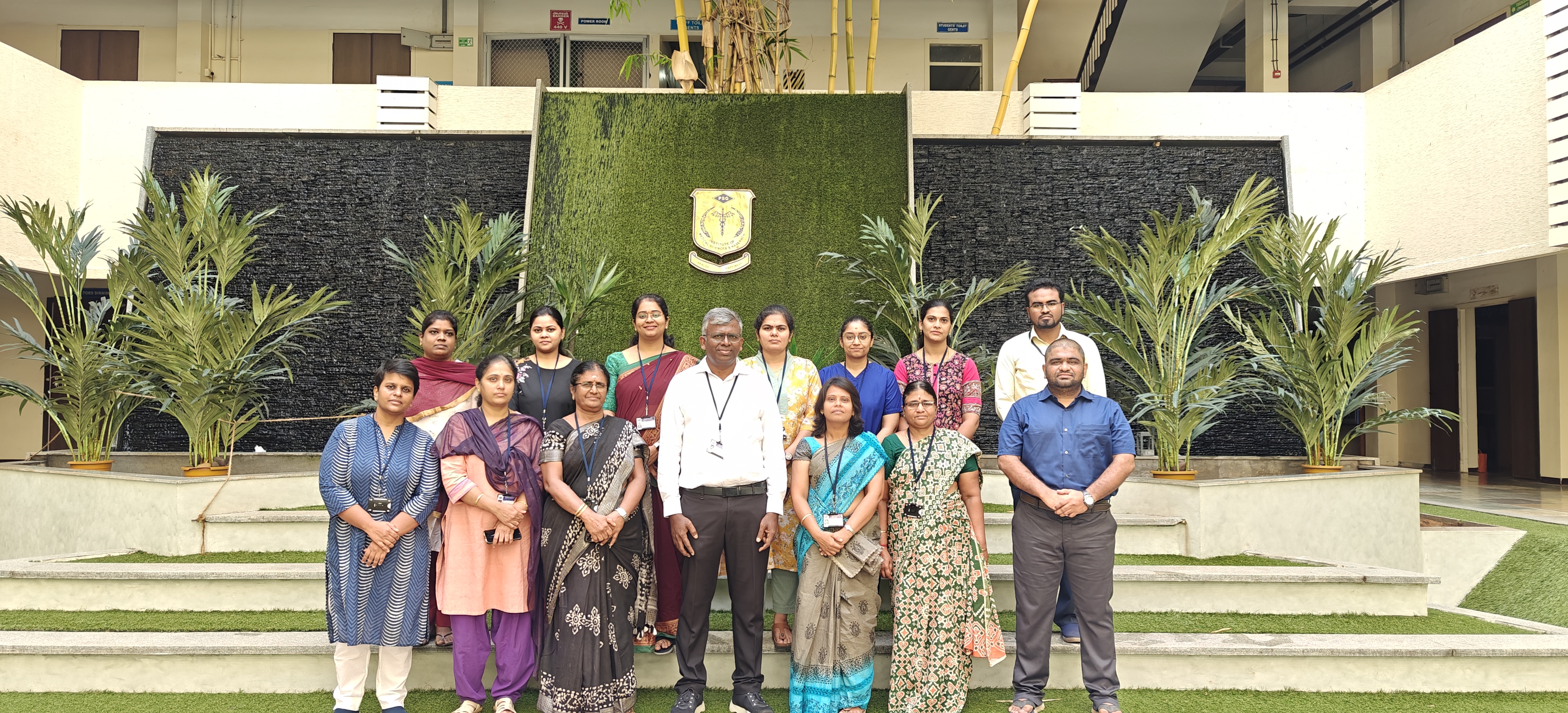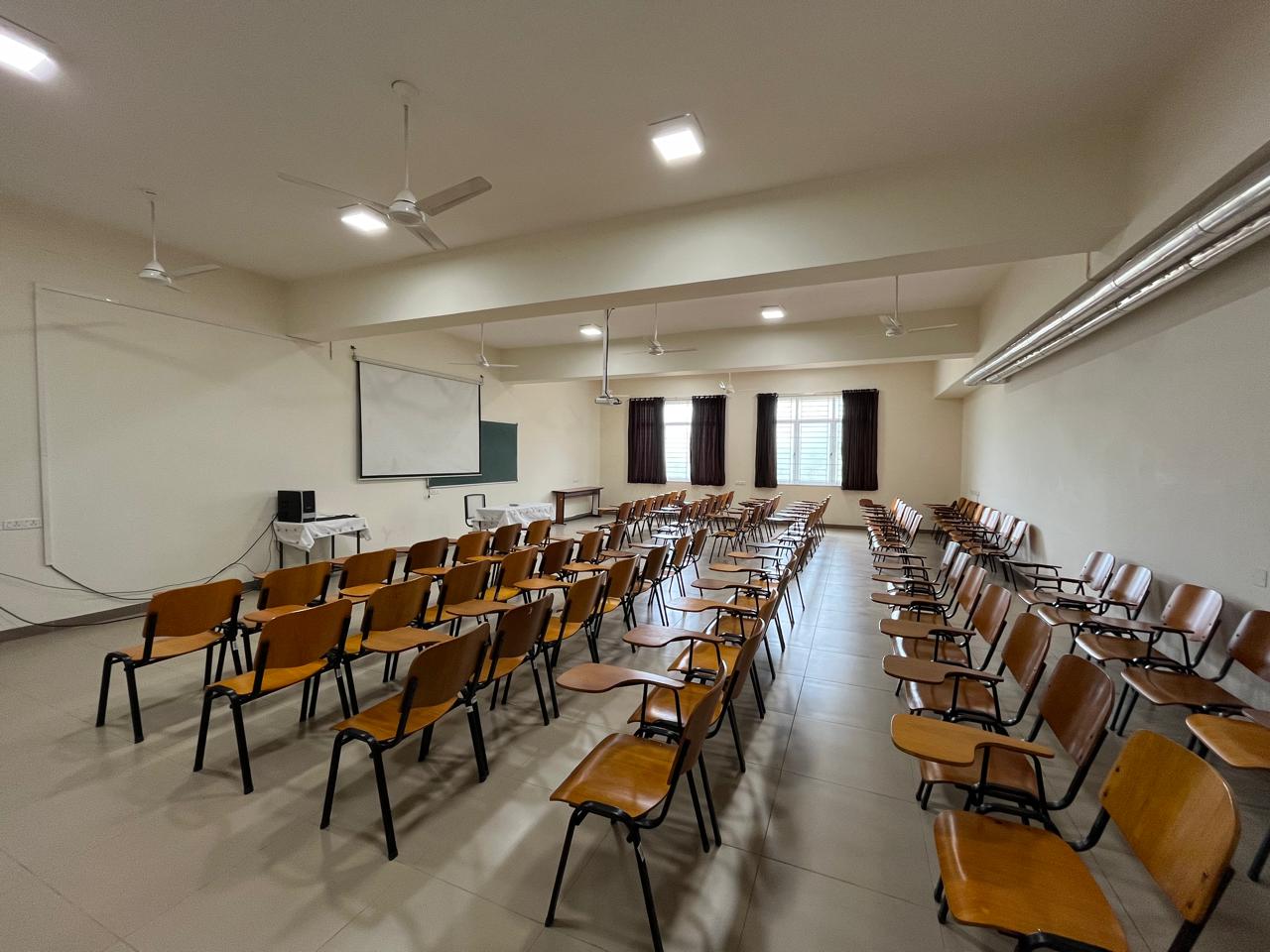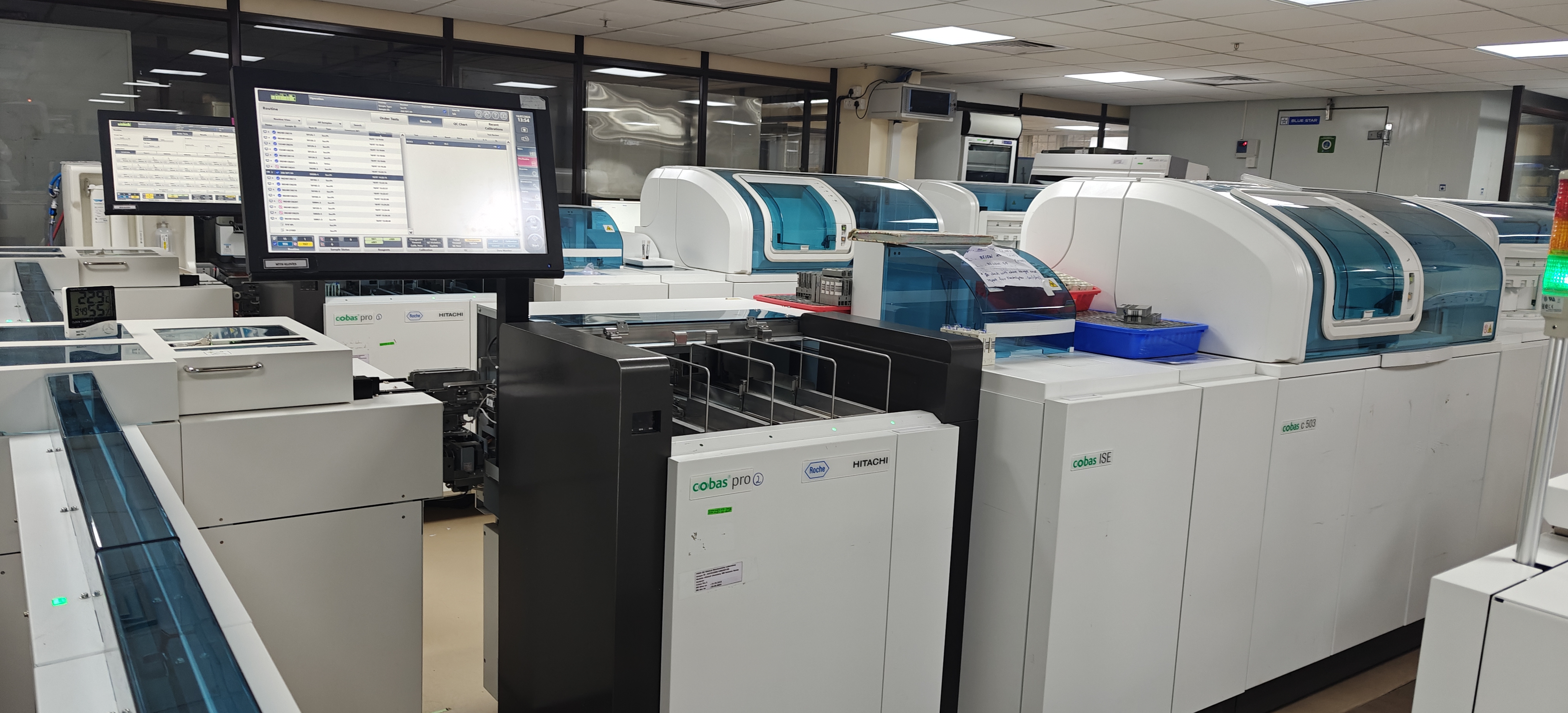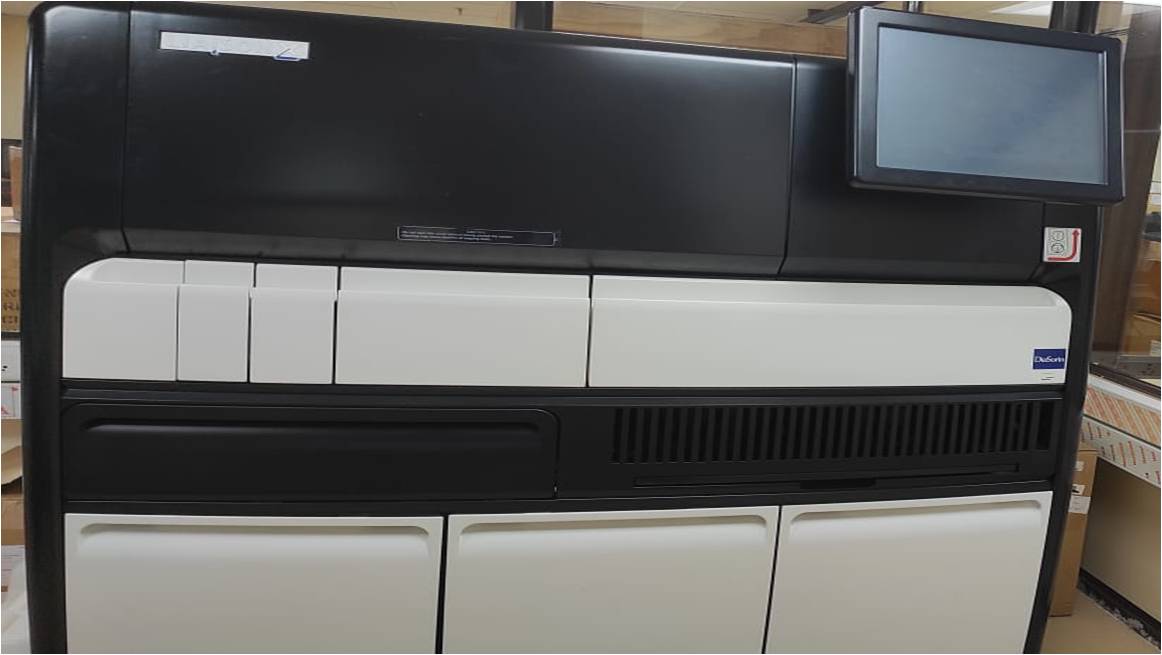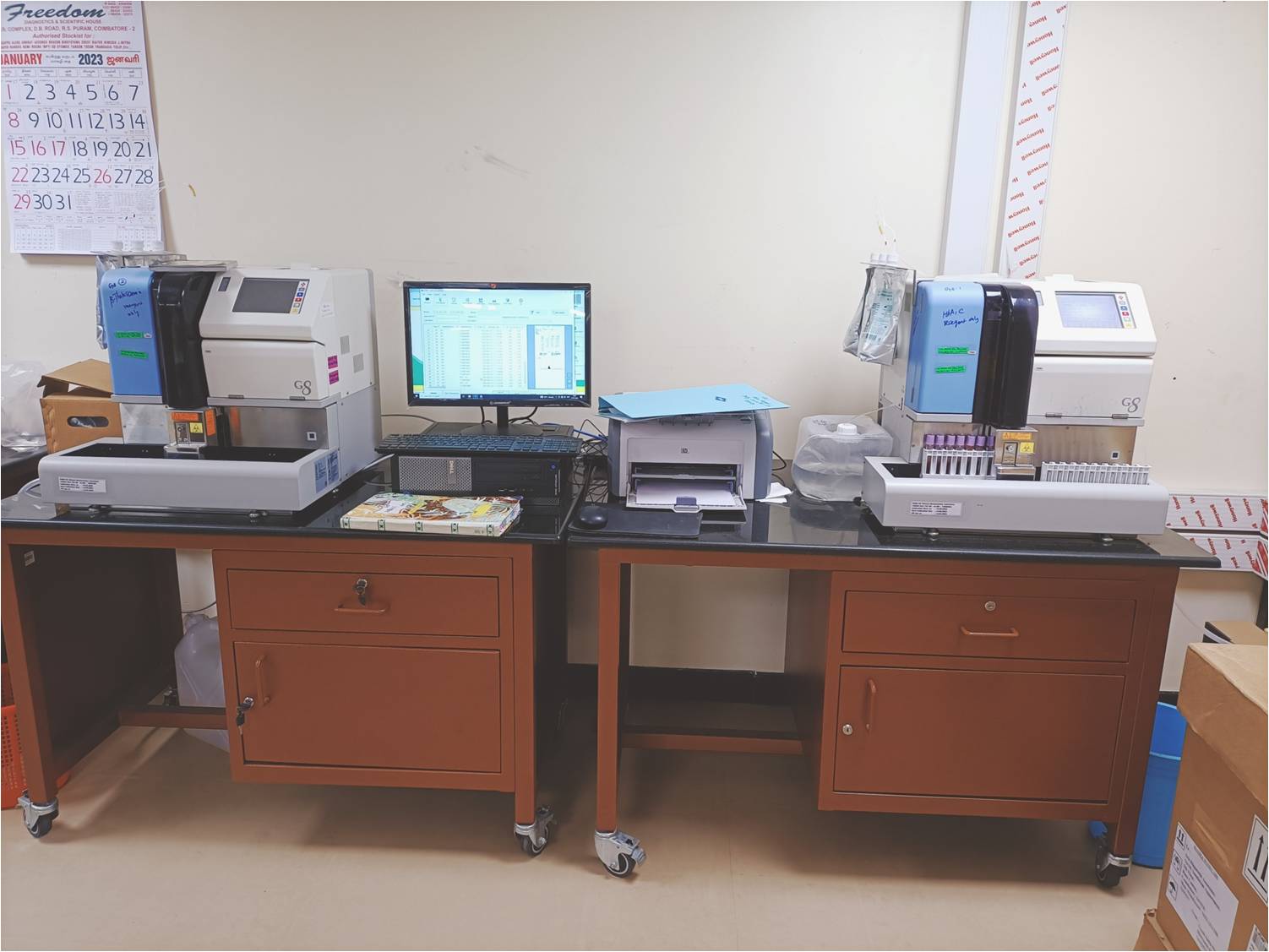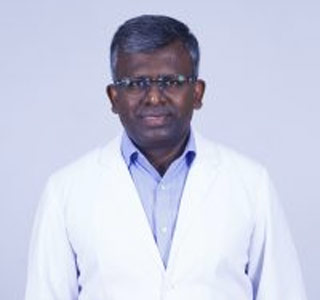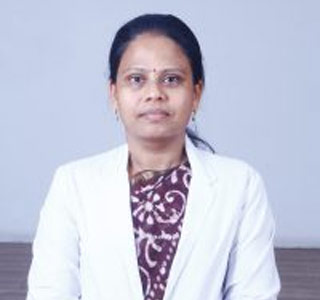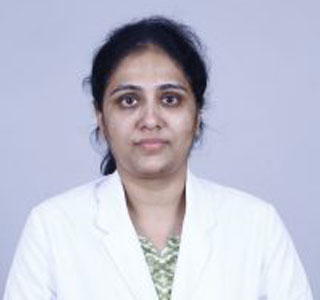
Biochemistry
The Department of Biochemistry at PSG IMS&R was founded in 1985 under the leadership of Dr. Thirumoorthy. Since its inception, the department has thrived with a focus on three main areas: education, diagnostic laboratory services, and research. In 1988, the Clinical Biochemistry Laboratory was established, marking a significant milestone in the department’s growth and contribution to healthcare and education.
The department launched its educational programs with MBBS in 1985, followed by MD in Biochemistry in 2009, and MSc in Medical Laboratory Technology in 2019.Educational initiatives include workshops, Continuing Medical Education (CME) sessions, and quiz programs covering a wide range of topics such as interpretation of biochemistry tests, instrumentation, and entrustable professional activities.
Contact Information
Email id:
biochemistry@psgimsr.ac.in-
Helpline:
+91 9952149911
The Department of Biochemistry is committed to fostering a dynamic learning environment for undergraduate and postgraduate students, equipping them with problem-solving skills essential for success in their professional careers. Our mission is to cultivate lifelong learners by providing a robust theoretical and practical foundation across various disciplines of biochemistry, while instilling a strong sense of professional and ethical responsibility.
Our faculty members are dedicated to implementing Competency Based Medical Education (CBME) curricula for both undergraduate and postgraduate students. We actively engage in research initiatives funded by prestigious bodies such as ICMR, DST, and through University Research Grants from TNMGR Medical University. Our faculty also serve as resource persons for activities at local, regional, and national organizations.The efforts of our faculty and students in the field of Biochemistry have been consistently recognized with awards and accolades, underscoring our commitment to excellence in education and research.
Academics
Undergraduate:
The department offers a comprehensive undergraduate teaching program encompassing MBBS, BSc (Medical Lab Technology), BSc (Allied Health Sciences), and BSc (Nursing) programs. Our approach to undergraduate training includes interactive theory classes, clinically relevant practical sessions, and OSPE/clinical case based discussions designed to stimulate interest in biochemistry concepts.
Faculty members provide additional academic support for students requiring assistance, with regular feedback provided on their academic performance. Many faculty members hold fellowships in medical education, enabling the implementation of innovative teaching methods such as flipped classrooms, team teaching for lectures, and online team-based learning, particularly beneficial during the COVID-19 pandemic. These methods effectively engage students and enhance their understanding of biochemistry concepts. Additionally, students are encouraged to pursue self-directed learning, fostering a commitment to lifelong learning among our graduates.
Since 2015, the department organizes the Ruckmani Ammal Memorial Gold Medal Exam for first-year MBBS students, aimed at fostering both learning and critical thinking among participants.
Postgraduate:
Postgraduate courses offered by the department include MD (Biochemistry) and MSc (Medical Lab Technology). The department organizes seminars, clinical case discussions, journal presentations, and topical discussions on a regular basis.
Postgraduate students benefit from a well-rounded education that includes training in undergraduate teaching methods, clinical biochemistry laboratory procedures and interpretations, total quality assurance practices, and research project development. They are actively encouraged to participate in conferences and present their research papers.MD postgraduates have postings in external departments, ensuring a comprehensive learning experience that enhances their overall competence and academic excellence.
Facilities
The department is well-equipped to support both undergraduate and postgraduate training and research. The biochemistry practical laboratory spans 380 sq.meters and accommodates up to 132 students during practical sessions. Additionally, there are four demonstration rooms, each over 100 sq.meters, equipped with facilities like audiovisual aids, capable of accommodating 80 students each.
For academic discussions and seminars, the department has a seminar hall measuring 32 sq.meters. A dedicated department library spanning 26 sq.meters houses more than 150 books, enhancing the knowledge of both faculty and students.
Furthermore, the research laboratory, covering 51 sq.meters, is equipped with essential instruments such as a Spectrophotometer, Electrophoresis power pack, ELISA reader with washer, TLC chamber, and Atomic absorption spectrophotometer. These facilities are instrumental in fostering robust research activities among faculty members and students alike.
Research
The Department of Biochemistry is dedicated to advancing the understanding of biochemical processes and their clinical applications. Equally important to our mission is our commitment to enhancing the teaching and learning environment. We strive to achieve this by conducting innovative educational research, applying new principles and methodologies to improve our pedagogical practices.
Key Research Areas
- Metabolic Disorders: Exploring biochemical pathways involved in metabolic diseases.
- Molecular Biology: Investigating gene expression and regulation.
- Pedagogical approaches: Exploring and implementing advanced pedagogical approaches to enhance biochemistry education.
MD Dissertations in the last 5 years
- Comparison of serum copper levels in Coronary artery disease patients and normal individuals – a case control study. Dr S Zinnia, 2019. Guided by Dr G Jeyachandran MD
- A study of Paroxonase gene polymorphism in Coronary artery disease – understanding the biochemical and genetic basis of Coronary artery disease. Dr J Fathima Nasreen, 2020. Guided by Dr B Gayathri B MD
- Comparison of untargeted metabolites in serum of human volunteers before and after sleep by gas chromatography- Mass spectrometry- [GC-MS]. Dr P Deepika, 2021. Guided by Dr G Jeyachandran MD
- A study on complement C3 and C4 levels in Ischemic heart disease. Dr B Shalitha Ann Stephen, 2022. Guided by Dr B Gayathri B MD
- Serum zinc , urine zinc-creatinine ratios in diabetic foot cases, diabetics without diabetic foot controls and healthy controls – a case control study. Dr R Ragapriya, 2023. Guided by Dr G Jeyachandran MD
CME / Workshop
CME and Workshops organized by the Department:
- Quemiztry – Biochemistry quiz for undergraduate students first edition on 0.04.2014
- CME on Interpretation of Acid base and electrolyte disorders on 28.08.2014
- Quemiztry – Biochemistry quiz for undergraduate students second edition on 12.04.2015
- Quemiztry – Biochemistry quiz for undergraduate students third edition on 24.04.2016
- CME on Molecular basis of malignancy- current trends on 23.06.2016
- Workshop on Instumentation in Clinical Chemistry first edition – 24.02.2017 to 25.02.2017
- Quemiztry – Biochemistry quiz for undergraduate students fourth edition on 23.04.2017
- Workshop on Instumentation in Clinical Chemistry second edition – 17.08.2017 to 19.08.2017
- Workshop on Instumentation in Clinical Chemistry third edition – 15.03.2018 to 17.03.2018
- CME on Indications and Interpretation of Clinical Biochemistry tests on 26.04.2018
- Quemiztry – Biochemistry quiz for undergraduate students fifth edition on 29.04.2018
- Workshop on Instumentation in Clinical Chemistry fourth edition – 26.07.2018 to 28.07.2018
- Workshop on Instumentation in Clinical Chemistry fifth edition – 07.03.2019 to 09.03.2019
- Quemiztry – Biochemistry quiz for undergraduate students sixth edition on 05.05.2019
- Workshop on Instumentation in Clinical Chemistry sixth edition – 25.02.2020 to 27.02.2020
- Workshop on Instumentation in Clinical Chemistry seventh edition – 16.06.2022 to 18.06.2022
- Workshop on Instumentation in Clinical Chemistry eighth edition – 18.08.2022 to 20.08.2022
- Quemiztry – Biochemistry quiz for undergraduate students seventh edition on 30.10.2022
- Workshop on Instumentation in Clinical Chemistry ninth edition – 09.05.2023 to 11.05.2023
- Workshop on Instumentation in Clinical Chemistry tenth edition – 14.02.2024 to 16.02.2024
- Online CME on Revolutionizing MD Biochemistry:Unveiling the Evolution of EPAs- Mastering the Basics on 12.04.2024
- Oral Iron Therapy- Changes in Plasma Peroxide & Anti Oxidant Enzyme Levels
- Effect of sun salutation and nadi shodhan Pranayama on glucose homeostasis and oxidative stress in type 2 diabetics
- Serum Magnesium: Prophet of Diabetic Complications
- The Clinical utility and diagnostic efficacy of an emerging parameter-Cystatin C
- Analysis of adenosine deaminase in patients with liver disease
- Anti Oxidant Status in Seizures Patients
- Plasma myeloperoxidase levels in patients with end-stage renal disease
- Serum Paraoxonase activity in chronic renal failure
- Postprandial Paraoxonase (PON) Activity in type-2 Diabetes
- Impact of Supplementation of Food Based Anti Oxidant Mix on the Antioxidant Status of Selected Breast Cancer Patients
- Butyrylcholinesterase Activity & Risk Factors for cardio Vascular Disease
- Role of Ischemia Modified albumin in the Early Diagnosis of Acute Myocardial Infarction
- Clinical Significance of Cardiac Troponin T Level in Chronic Kidney Disease: Predictive Value for Cardiovascular risk 2009-2010
- Role of NT pro BNP as a Marker of cardiac Failure in Chronic Renal Disease
- Dyslipidemia in critically ill patients
- Serum Paraoxonase activity in critically ill sepsis patients
- Oxidative stress and inflammatory markers in pregnancy induced hypertension
- Association of oxidative stress parameters and thyroid status during pregnancy
- Plasma myeloperoxidase levels to predict prognosis in patients with acute coronary syndrome
Studies on Oxidative stress, Insulin resistance and Paroxanase in NASH as a predictive risk factor for cardiovascular disease - Evaluation of Oxidative and nitrative stress in pancreatitis
- Histopathological changes and Oxidative stress assessment to study bacterial translocation in chronic liver disease
- Effect of selemium enriched eggs on reducing Oxidative stress in sports women
- Study on the effect of spirulina on lipid peroxidation in young healthy rats
- Supplementation of tomato juice and effect of lycopene on nutritional status, Oxidative stress and physical fitness of selected athelets
- Serum Paroxanase in fatty liver
- Effect of antiplatelet therapy on glycemic indices, biochemical markers of oxidative stress and inflammation in type 2 diabetes mellitus patients
- Plasma myeloperoxidase levels in type 2 diabetes mellitus
PSG Biochemistry Diagnostic Lab:
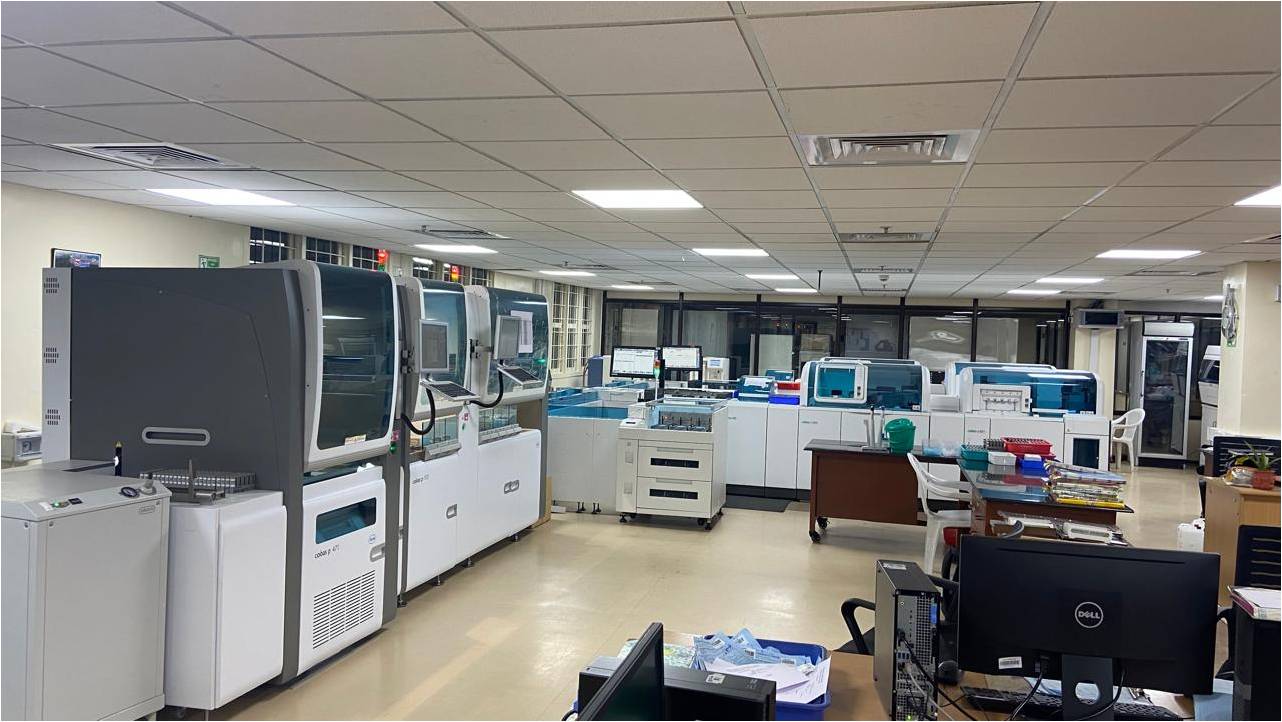
Infrastructure:
Situated in an ample work space of 6100 square feet , the lab is committed to provide high quality test results that are reliable and accurate, while meeting the global market standards. This is to ensure a holistic and comprehensive care offered to the patient on a timely basis at an affordable cost. The lab boasts of climate/temperature controlled infrastructure. More than adequate space has been made available for individual instruments and the cooling systems in place are highly efficient in keeping the temperature of the lab conducive enough to run the machines throughout the day without unnecessary breaks
Personnel and faculty:
The lab is run by technically sound, competent and efficient doctors and highly motivated technical personnel
The lab is run as directed by Dr. G. Jeyachandran MD , who is also the professor and head of the Department of Biochemistry. Dr.B.Gayatri is the technical manager who is duly supported by Dr.MeenakshiSundaram A.S. and Ms. V. Arunawho are the deputy technical managers.
The Quality manager is Dr. DVijaya who is ably aided by the deputy quality managers Dr.G. Sumithra, Dr.R. Sujatha and Dr.B. Dhanalakshmi and Dr.P.Deepika.
The personnel and the instruments are committed to deliver impartial services to the community while maintaining the privacy and confidentiality of the patients.
NABL accreditation:
The laboratory has been bestowed with the honour of NABL accreditation since 2011. Currently the setup is under the able guidance or Dr. G. Jeyachandran and Dr. D. Vijaya. They bring to the laboratory, invaluable years of rich experience ,also gained by them in the process of being national assessors of various NABL accredited labs throughout the country. All the faculty members of the laboratory are duly well trained in the standard NABL certified audit programs.
Lab Setup
Each instrument is maintained in a pre-scheduled systematic maintenance flow path which makes sure that the downtime of any instrument if by rare chance, doesn’t impact the testing of the samples and the release of reports in any manner.
The lab employs a range of high throughputauto-analysers to process the high volume of patient- samples befitting the PSG Hospital complex which is comprised of the Academic learning hospital block, the Super speciality care block and the newly inaugurated state-of-the-art block dedicated solely for oncology, keeping in mind the evolving needs of the society .
The work space is equipped with thoroughly validated, calibrated, robust machines and instruments which are subjected to rigorous quality control procedures on a daily basis – 24x7x365
Automation of work flow: (from pre-analytical procedures through analysis to post analytical reporting)
Seamless automation is implemented in the lab using Cobas Pro machines commissioned from Roche diagnostics.(In addition to the automated set- up, some instruments are handled manually too)
The lab boasts of a clutter-free automation system which is ably supported manually.
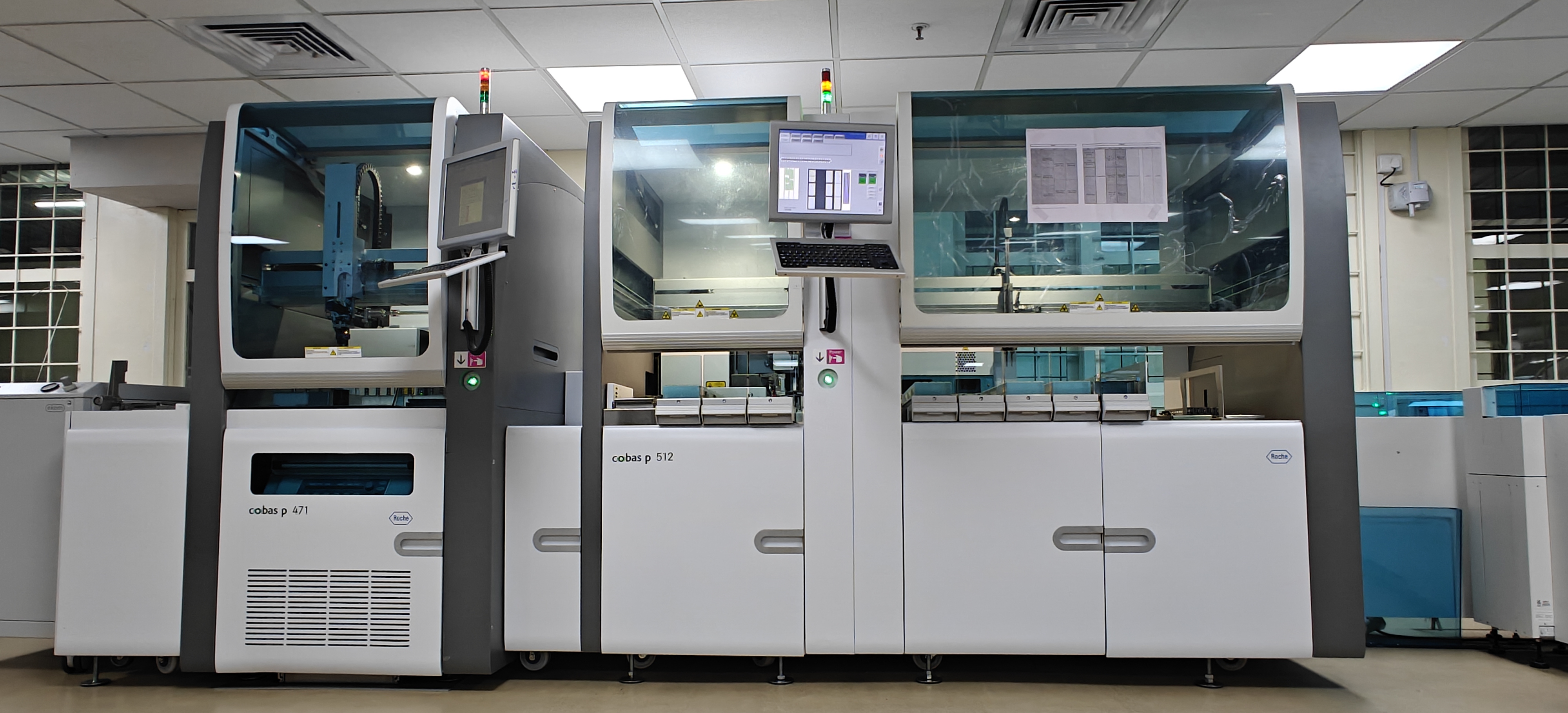
We have centrifuges recruited to spin the samples received in the lab and an automated centrifuge is available,in-built with the Cobas Communication module (CCM) .
The CCM is boosted by the presence of 2 submodules namely P471 and P512. The former helps with auto-centrifugation of the un-spun samples with intelligent deduction of the type of samples and the barrage of tests to be done on the respective samples. It has a capacity of spinning 495 tubes/hour with a spin time of 5 minutes per tube or 300 tubes/hour with a spin time of 10 minutes per tube.
The CCM using P471 module, sorts the tubes into on-track and off-track tubes (off track tubes are the ones processed outside the scope of the CCM).The off track samples immediately navigated through the respective instruments.
The on-track CCM instrumentation for chemistry and Immunology analysis is under the scope of Cobas ‘ Pro’ machines that are comprising of C503, e801 and ISE units from Roche. The on-track sample sorting is under the surveillance of P512 module which automatically performs the Haemolysis, Icterus and Lipemia indices survey ( HIL) . It verifies the integrity of the spin quality . It also determines the adequacy of each sample ( through, Quantity-not-sufficient/QNS analysis). The samples are photographed using P512 and the imagesare made available in the laboratory middleware. All eligible samples are de-capped and transferred to the Cobas 5 position rack which helps with the intelligent routing of the said samples onto 2 lines of Pro 1 and 2 instruments.
We possess an incredible middleware system ( previously “ Infinity” and now referred to as “ Navifylab operations/NLO “) . This middleware marks the evolution of higher order of automation that helps the user to validate or verify or report the tests at ease.
The analysed samples from the output unit are manually mounted onto P512 for automated aluminium foil sealing . The sealed samples are mapped by NLO and stored in accordance with the needs and lab policies. The P512 has a capacity of sealing 1400 tubes an hour.
The total Cobas communication module system has a throughput of performing 1000 chemistry, 900 ISE and 300 immunoassay for every -Pro machine and we utilise two such machine simultaneously. The intelligent middleware has the capacity of handling 1,50,000 test results per day with effortless ease.
This is an honest reflection of the capacity of the lab which can seamlessly offer robust support to the clinicians even in un-foreseen high load conditions without any hiccups.
The hospital has commissioned and utilised the services of state-of-the-art instruments like :
Rapid lab 1265(Arterial Blood Gas analyzers)from Siemens, Omni Cobas b221 from Roche,AVL 9180 ( Lithium/ electrolyte analyser) from Roche, (Clinical chemistry analysers) Cobas e411 autoanalyserfrom Roche,Automated HPLC systemsof ( Hemoglobinfractions and variants estimation using)G8 machinesfrom Tosoh, Serum Protein Electrophoresis analyser from Sebia, (Osmolality)K7400 Semi Micro- Osmometer from Knauer, (Copper estimation) Atomic Absorption spectrometer from Szhimadzu and Perkin Elmer. Fecal calprotectin and fecal elastase estimation required for Gastroenterology is now available using instruments from Diasorin.
Cold storage:
The calibrators, reagents, QC materials and diluents are thoroughly validated and are stored in an efficient cold storage room that rigorously maintains a temperature interval of 2 to 8 degree Celsiuswhich helps with integrity of the same materials for more than specified and desired duration of time. The cold room has a space of 12x 14 feet which makes it adequate to store the requisite materials.
Infection control policies in the laboratory:
When it comes to safety with respect to infectious exposures, the laboratory maintains rigorous standards at work. The objective of the hospital infection control is adopted by the laboratory which is to provide Safe and quality healthcare facility for the patients, their attendants and the health care workers by adopting a comprehensive infection control program involving all sections of the community .The program along with facilitating good hospital practices also teaches our staff and students the necessary values , attitudes and practices to prevent and control hospital acquired infections . The lab personnel are insisted in maintaining and practising rigorous hand hygiene along with usage of gloves ,apronsfootwear. They are strongly recommended to utilise protective gear whenever deemed necessary.
All staff are expected to strictly adhere to standard precautions . All clinical materials are considered potentially infections and all procedures and manipulation areperformed carefully to minimize aerosol or spillage. Masks are donned while manually centrifuging the samples . The centrifuges are opened only when it comes to a complete halt . Every day and whenever the tubes break inside the centrifuge , it is cleaned with 1% sodium hypochlorite. Biological safety cabinet isused for all procedures involving clinical material. Gloves-usage is made mandatory for all procedures on infective material. Eye protection and mask will be required when splashes are anticipated.
All personnel immediately remove their gloves and protective clothing following Completion of work and wash their hands before moving on to other activities. Personnel with open skin wounds, extensive eczema or dermatitis are strongly advised to avoid handling specimens contaminated with blood and infectious body fluid.
Our laboratory doesn’t allow mouth pipetting by the technicians and are trained to follow the lab SOP manual for safe handling, storage and disposal of the clinical material used for diagnosis.
Accidental exposure to blood and body fluids are promptly reported to the supervisors in the area and actions taken as per the hospital policy.
Biomedical waste management:
Waste generated in these areas are disposed in appropriate color coded containers as per the hospital Biomedical waste management policy. Urine , faeces and other liquid waste from lab are pretreated with 1% sodium Hypochlorite and sent to ETP / STP.
Our Faculties
HoD
Professor
Associate Professor
-
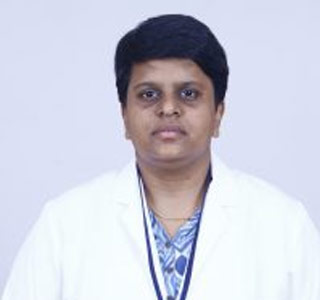
Dr. R. Sujatha
Biochemistry
Associate Professor
-

Dr. A. S. Meenakshi Sundaram
Biochemistry
Associate Professor
Assistant Professor
-
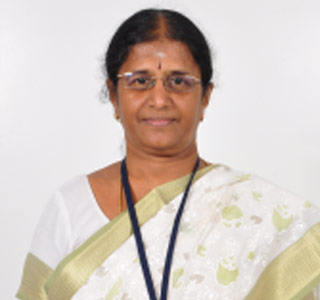
Dr. Vijaya D
Biochemistry
Assistant Professor
-
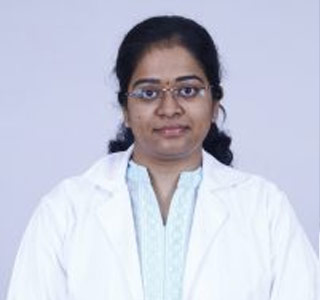
Dr. Dhanalakshmi B
Biochemistry
Assistant Professor
-
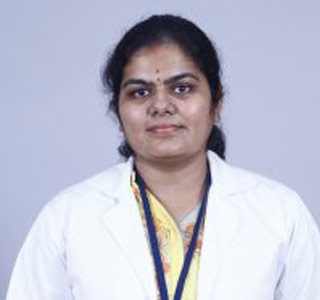
Dr. Deepika P
Biochemistry
Assistant Professor
Tutor
-

Dr. Gokul Kumar V M
Biochemistry
Tutor
-

Dr. A Harsha Vardhanan
Biochemistry
Tutor
-

Dr. Renuka Soundra PaulRaj
Biochemistry
Tutor
-

Dr.Karthika Sivaprakash
Biochemistry
Tutor
-

Dr.Gowsik J
Biochemistry
Tutor
-

Dr.Shruthi Priyanka R
Biochemistry
Tutor
-

Dr.Shalini V
Biochemistry
Tutor
-

Dr. Sabina Lois N
Biochemistry
Tutor



